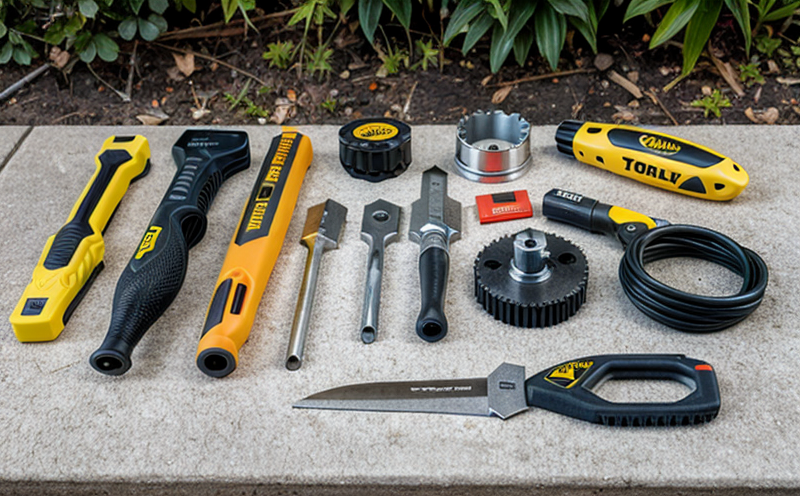Heat Resistance Testing of Hardware Materials
The heat resistance testing of hardware materials is a critical service provided by our laboratory to ensure that products meet safety and performance standards, especially in sectors where exposure to high temperatures is common. This testing evaluates how well a material can withstand elevated temperatures without degrading or failing, which is essential for the integrity and longevity of hardware components used in various applications.
Material selection plays a pivotal role in many industries, including automotive, aerospace, construction, and consumer products. By conducting heat resistance tests, we help manufacturers identify suitable materials that can endure operational conditions without compromising safety or performance. For instance, in the automotive industry, materials must withstand engine temperatures during operation to ensure reliability.
The testing process involves exposing samples of hardware materials to controlled temperature environments. This method allows us to simulate real-world conditions and assess material behavior over time. The primary objective is to determine the maximum temperature at which a material remains stable or fails under specified conditions. This information is crucial for optimizing product design, ensuring compliance with international standards such as ISO 7519-2:2006 (Heat resistance of plastics — Part 2: Determination by thermogravimetric analysis).
During the test, we carefully prepare specimens according to industry best practices. Specimen preparation includes cutting samples into appropriate sizes and shapes that accurately represent the intended use in a product. Once prepared, these specimens undergo rigorous testing using advanced thermal analysis equipment capable of simulating high-temperature environments.
| Industry Sector | Application Example | Heat Resistance Requirement |
|---|---|---|
| Automotive | Engine components like pistons and exhaust systems. | Materials must withstand temperatures up to 500°C without deformation or failure. |
| Aerospace | Structural components such as landing gears and engine parts. | Components need to maintain structural integrity at temperatures exceeding 600°C during re-entry into the atmosphere. |
| BUILDING MATERIALS | Roofing materials, insulation panels used in construction. | Must retain their properties up to 250°C to ensure durability and safety during installation or use. |
The results of heat resistance tests provide valuable insights into material performance under extreme conditions. These findings can guide engineers in selecting appropriate materials for specific applications, enhancing product reliability and reducing the risk of failures due to excessive temperature exposure.
Benefits
- Enhanced Safety: Ensures that hardware components do not degrade or fail under high temperatures, protecting end-users from potential hazards.
- Achieving Compliance: Helps manufacturers comply with international standards and regulations related to material performance at elevated temperatures.
- Informed Decision-Making: Provides data that informs design choices, ensuring products are optimized for both safety and functionality.
Industry Applications
| Industry Sector | Application Example | Heat Resistance Requirement |
|---|---|---|
| Consumer Products | DIY tools and hardware components for home improvement. | Materials must resist temperatures up to 200°C without compromising usability or integrity. |
| Medical Equipment | Parts of surgical instruments that come into contact with high-temperature sterilization processes. | Materials need to endure autoclave temperatures up to 134°C without altering their properties or degrading. |
Understanding the heat resistance of hardware materials is vital for industries where durability and safety are paramount. Our testing ensures that manufacturers can confidently select materials that meet these stringent requirements, thereby enhancing product quality and reliability.
Customer Impact and Satisfaction
The heat resistance testing service we offer has a direct impact on customer satisfaction by ensuring the safety and longevity of hardware products. By meeting or exceeding industry standards, our clients can trust that their materials will perform reliably under challenging conditions. This not only enhances brand reputation but also reduces warranty claims and recalls.
In addition to technical excellence, we prioritize clear communication with customers throughout the testing process. Our team works closely with quality managers, compliance officers, R&D engineers, and procurement teams to understand their specific needs and provide tailored solutions. This collaborative approach ensures that our clients receive actionable insights that drive informed decision-making.
Our rigorous testing protocols, coupled with advanced instrumentation, allow us to deliver accurate and reliable results consistently. These results enable customers to make confident choices about material selection, thereby improving overall product performance and reducing potential risks associated with temperature-induced failures.





